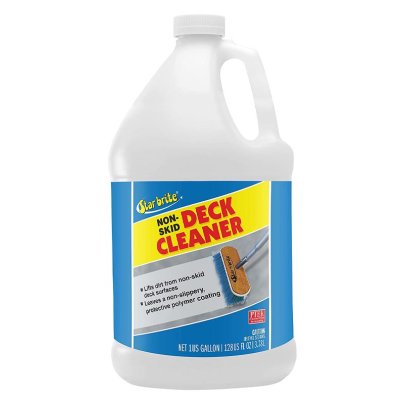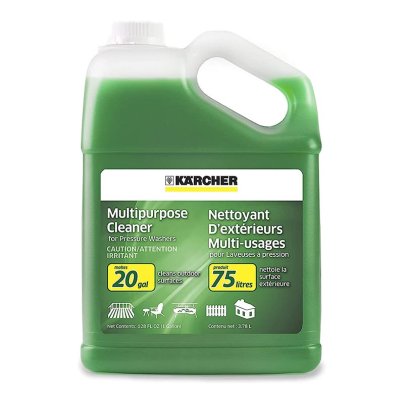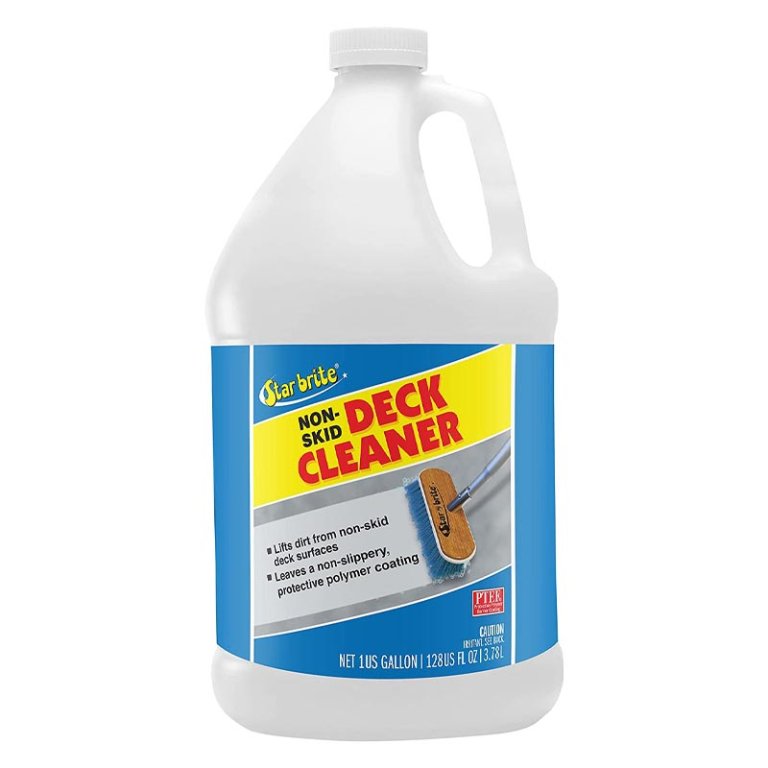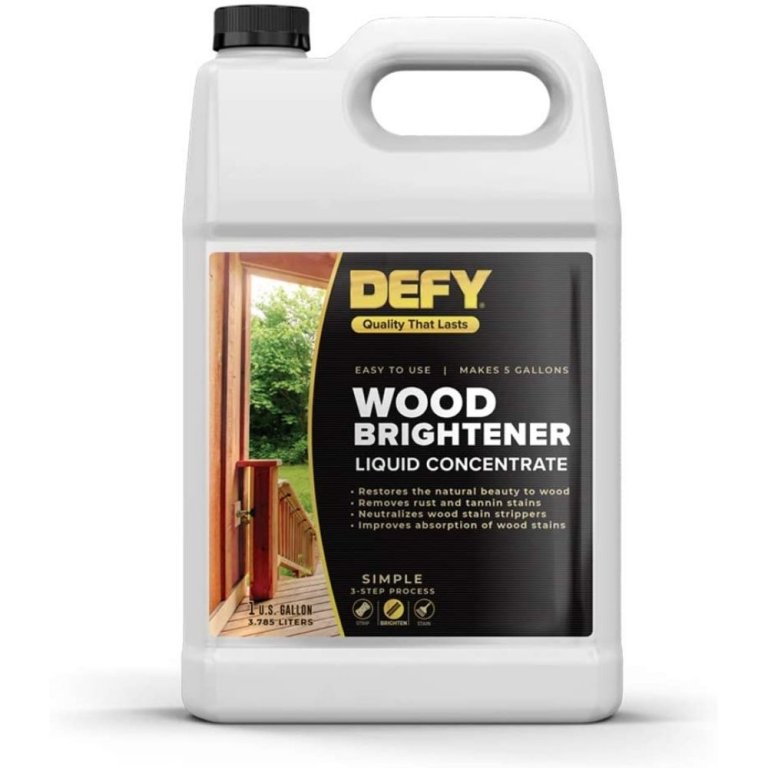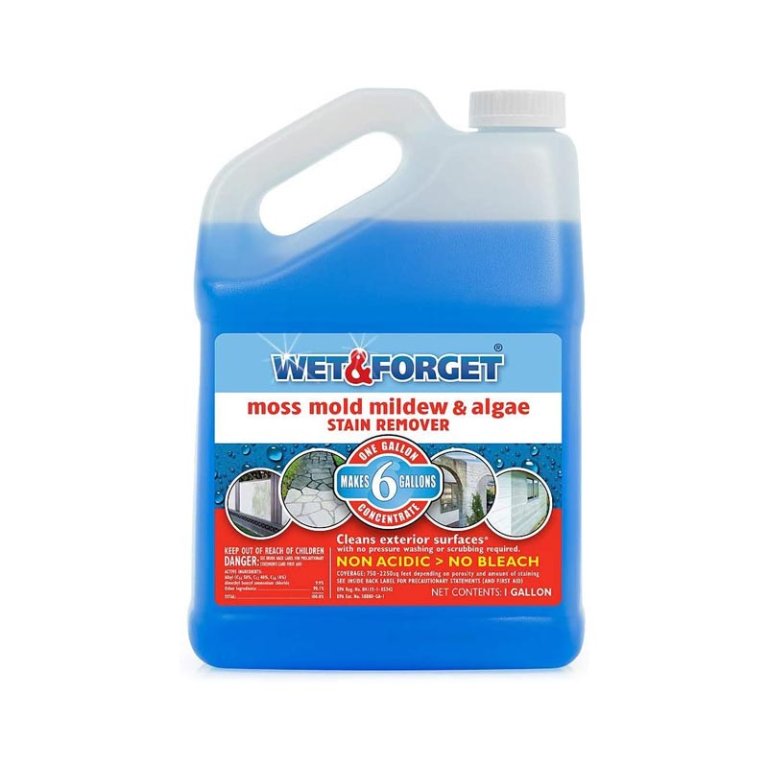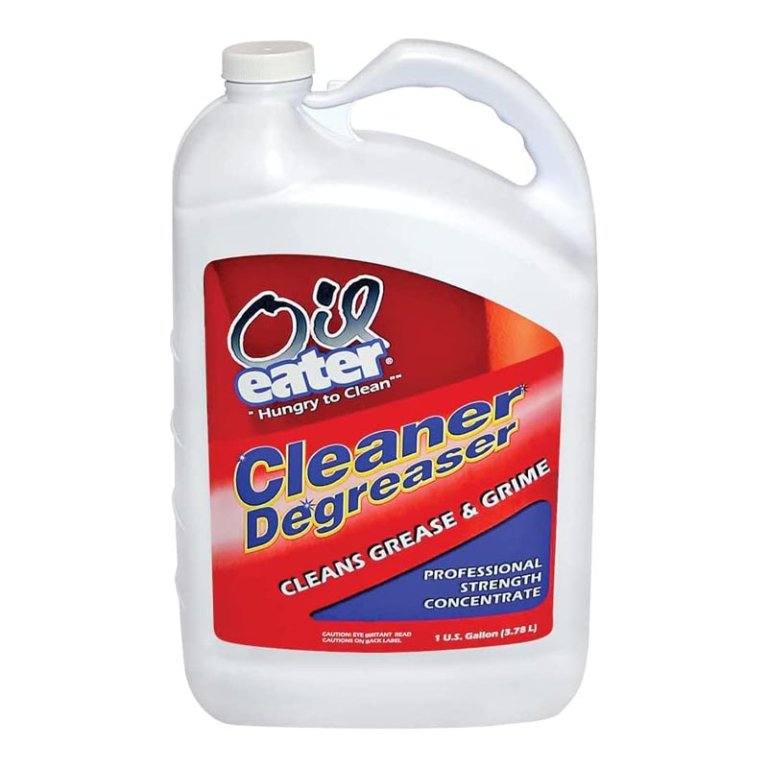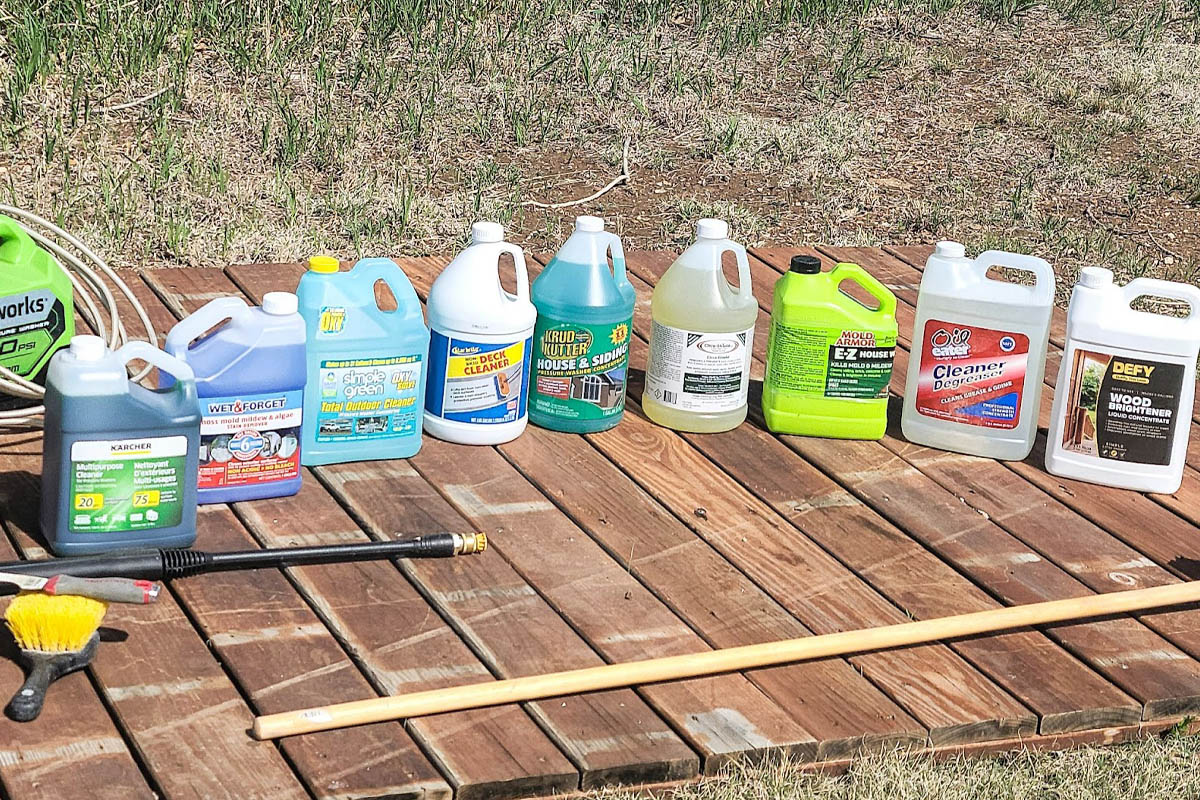
We may earn revenue from the products available on this page and participate in affiliate programs. Learn More ›
Outdoor decks are favorite spots for entertaining and relaxing, but like all exterior surfaces, they eventually get dirty. Left that way, they can become dingy and drab before their time. To keep your deck looking great, it’s recommended to clean it annually—ideally in spring or early summer—and then follow up with a sealer for extra protection from the elements. But with dozens of deck cleaning products available, choosing the best one can be a challenge.
That’s why I set out to personally put a host of popular products through their paces. I selected the top-selling deck cleaners on the market and used each one to tackle actual decking boards that had been stained with dried-on mud and grease splatters from the grill. To my surprise, some products that I expected to do well failed to earn a space in this lineup. My top pick, the Star Brite Non-Skid Deck Cleaner, was easy to use, very effective, and affordable. Keep reading to learn more about selecting the best deck cleaner for your needs, and find out how the following products performed in my tough deck cleaner tests.
- BEST OVERALL: Star Brite Non-Skid Deck Cleaner & Protectant
↓ Jump to Review - BEST PRE-STAINING: Defy Wood Brightener Liquid Concentrate
↓ Jump to Review - BEST FOR PRESSURE WASHER: Karcher Pressure Washer Multipurpose Cleaning Soap
↓ Jump to Review - BEST FOR MOLD AND MILDEW: Wet & Forget Outdoor Cleaner Concentrate
↓ Jump to Review - BEST FOR OIL AND GREASE: Oil Eater Original Cleaner & Degreaser
↓ Jump to Review - BEST ECO-FRIENDLY: Simple Green Oxy Solve Total Outdoor Cleaner
↓ Jump to Review
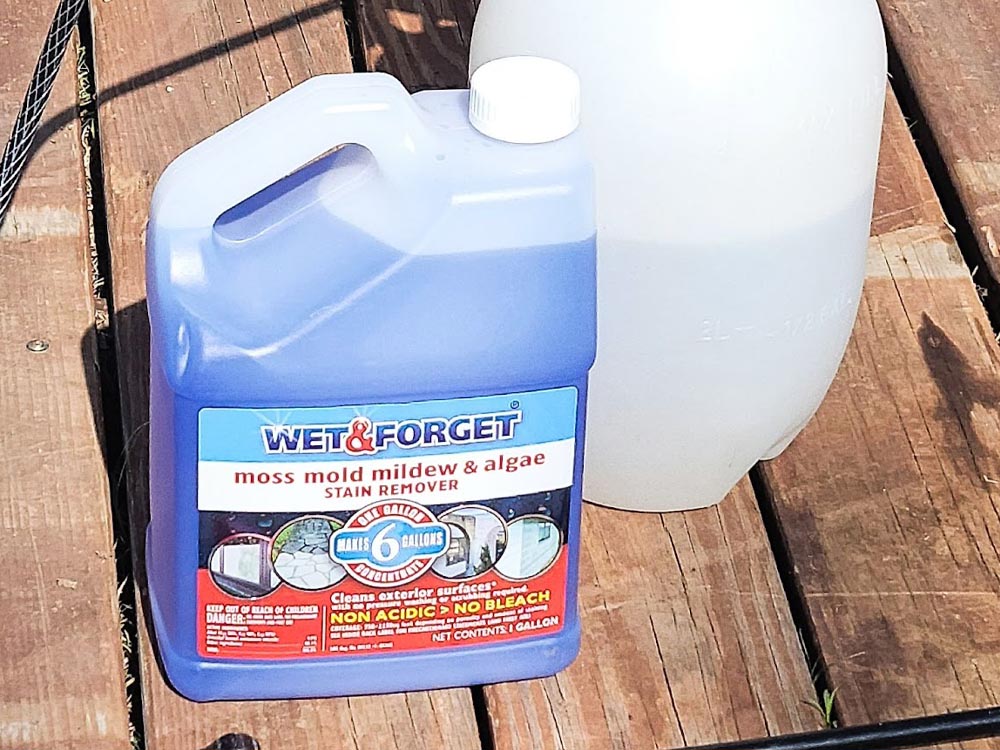
| Designed for | Application method | Special properties | |
| Star Brite Non-Skid Deck Cleaner & Protectant | Painted decks, fiberglass decks | Apply full-strength | Loosens stains without damaging paint |
| Defy Wood Brightener Liquid Concentrate | Wood decking | Pump-sprayer, brush | Lightens existing wood tone |
| Karcher Pressure Washer Multipurpose Cleaning Soap | Wood, masonry, metal, vinyl, and automobile exteriors | Power washer, dilute and brush on | Breaks down stains quickly |
| Wet & Forget Outdoor Cleaner Concentrate | Removing mold from wood, masonry, metal, and concrete | Dilute in bucket or pump-sprayer | Kills mold and removes mold stains |
| Oil Eater Original Cleaner & Degreaser | Oil stains on wood, concrete, bricks, metal, tools, and automobiles | Dilute and brush on or use in power washer | Dissolves greasy stains |
| Simple Green Oxy Solve Total Outdoor Cleaner | Removing stains from wood, masonry, metal, vinyl, automobiles | Power washer or dilute and brush on | Nontoxic |
Our Top Picks
To earn a spot in this lineup, the following deck cleaners had to live up to their manufacturer’s claims of removing mud and grease stains completely. If they were specialty cleaners—such as a deck brightener or a mold remover—they had to excel at those particular tasks. I tested each deck cleaner according to the recommended methods: pouring, spraying, brushing, or applying with a pressure washer.
Ahead, find out how each of these popular products fared in my hands-on tests, and learn the pros and cons of each product that I discovered during the testing phase.
Best Overall
Star Brite Non-Skid Deck Cleaner & Protectant
What We Like
- Easy to use; simply apply, wipe off, and rinse
- No mixing or diluting required before application
- Dissolves dirt without harming painted surfaces; ideal for sealed wood varieties
What We Don’t Like
- Failed to impart a nonslip surface; may not be ideal for some users’ preferences
Product Specs
- Designed for: Painted decks, fiberglass decks
- Application method: Apply full-strength
- Special properties: Loosens stains without damaging paint
Our Ratings: Ease of Use 5/5; Effectiveness 4.5/5; Value 5/5
Painted and composite decks require a gentle cleaner like Star Brite Non-Skid Deck Cleaner, which contains non-caustic chelating detergents to vanquish spills and dirt without scrubbing. Although Star Brite claims to be suitable for painted surfaces, I was concerned that it might strip the paint from a painted deck. To find out, I put two coats of deck paint on a new decking board, let it cure for a full week, then smeared it with mud and grease.
Then, per the manufacturer’s directions, I wet down one end of the painted board with water and poured on a small amount of Star Brite—full strength. After letting the solution sit for a few minutes to soften the stains, I wiped the board with a soft rag, and the mud and grease came right off. To complete the test, I rinsed the board with water to remove any errant cleaner, and once it was completely dry, I inspected the paint. It looked great—as intact as the other end of the board that I hadn’t cleaned.
Star Brite claims to leave behind a nonskid polymer coating, so I wet down the board again and rubbed my fingers over both ends to see if I could tell the difference. It was difficult to feel whether the section cleaned with Star Brite had more friction, but it certainly didn’t make it any slicker. So while I cannot truly recommend the product as having a nonskid benefit, I was impressed by its ability to clean painted decking without harming the paint job. A 1-gallon jug cleans and treats a deck up to 1,000 square feet.
Get the Star Brite deck cleaner at Amazon.
Best Pre-Staining
Defy Wood Brightener Liquid Concentrate
What We Like
- Easy to use (dilutes at a 1:4 ratio); simply apply, wait, and rinse off
- Versatile application; can be applied with a brush or pump sprayer
- Lightens (bleaches) wood to remove stains
What We Don’t Like
- Raises the wood grain and leaves a slightly rough surface
Product Specs
- Designed for: Wood decking
- Application method: Pump-sprayer, brush
- Special properties: Lightens existing wood tone
Our Ratings: Ease of Use 5/5; Effectiveness 3.5/5; Value 4/5
For those looking to clean and brighten a weathered wood deck before applying a fresh coat of deck stain, Defy Wood Brightener is a worthy option. This cleaner treats decks up to 1,000 square feet, and it removes light dirt, rust stains, and the dark tannin stains left behind by decaying leaves. It’s suitable for use on all types of wood.
Defy isn’t a typical deck cleaner; its purpose is to remove penetrating stains and lighten the wood so the new stain color will absorb evenly. So for testing, rather than smear a board with grease and mud, I poured coffee on a new wood decking board, letting it soak in and dry. Then I diluted Defy at the recommended 1:4 (cleaner to water) ratio and used a deck brush to apply an even coat. I waited 5 minutes as instructed and rinsed off the solution before letting the board dry.
Defy did lighten the coffee color to the point that the board looked nearly new again. However, the solution also raised the wood grain slightly—though the reaction is typical for this type of product, it makes the surface of the wood slightly rough. Those wanting a smooth deck surface may opt to sand the wood after lightening it with Defy and before staining and sealing.
Get the Defy deck cleaner at Amazon, Walmart, or Heller’s Hardware.
Best for Pressure Washer
Karcher Pressure Washer Multi-Purpose Cleaning Soap
What We Like
- Versatile formula; safely cleans many outdoor surfaces
- Suitable for power washer use for a very deep clean
- Biodegradable formula; ideal for households that prefer low-chemical formulas
- Excellent stain removal capabilities; ideal for very dirty decking
What We Don’t Like
- Left my skin slightly red and itchy where it splashed
Product Specs
- Designed for: Wood, masonry, metal, vinyl, and automobile exteriors
- Application method: Power washer, dilute and brush on
- Special properties: Breaks down stains quickly
Our Ratings: Ease of Use 4/5; Effectiveness 5/5; Value 5/5
For quickly powering away dirt, stuck-on debris, and stains with a pressure washer, check out Karcher’s Pressure Washer Multi-Purpose Cleaning Soap. It’s formulated for use on decks and other wood surfaces, including fencing.
For testing, I employed a pressure washer, but the solution can also be applied by diluting at a ratio of 1:20 (cleaner to water) in a bucket and then brushing it on the surface. In addition to cleaning decks, Karcher is suitable for other outdoor items, including concrete and siding. Karcher doesn’t estimate per-square-foot coverage, but it does make 20 gallons of cleaning solution, so it should go a long way.
I filled the dispenser on my pressure washer with Karcher, full strength, and attached the garden hose, plugged the washer in, and turned it on the board, previously slathered with mud and grease. The cleaning solution quickly removed the stains, and when the board dried, I couldn’t see any trace of them.
This multipurpose exterior cleaner contains powerful ingredients that break down and dissolve stains for a deep and thorough clean. After my test board was cleaned, I tried the solution on a concrete patio and some brick steps, and it made quick work of cleaning them as well. I was impressed enough to purchase this Karcher product again, although I would recommend wearing protective clothing, as it left my skin red and itchy where it splashed.
Get the Karcher deck cleaner at Amazon, Tractor Supply Co., or The Home Depot.
Best for Mold and Mildew
Wet & Forget Moss, Mold, Mildew & Algae Stain
What We Like
- Can be used in a pump-sprayer for ease of application
- No-rinse formula; simply leave on and forget
- Kills mold and lightens mold stains; ideal for those that live in moist environments
What We Don’t Like
- May harm foliage; spray nearby grass and shrubs with water
Product Specs
- Designed for: Removing mold from wood, masonry, metal, and concrete
- Application method: Dilute in bucket or pump-sprayer
- Special properties: Kills mold and removes mold stains
Our Ratings: Ease of Use 4/5; Effectiveness 5/5; Value 4/5
Don’t want to put in a lot of elbow grease? Consider Wet & Forget Moss, Mold, Mildew & Algae Stain Remover. A liquid concentrate that dilutes with water, it doesn’t require any scrubbing, mopping, or even rinsing. It dilutes at a 1:5 (cleaner to water) ratio, is safe for use on walkways and most types of siding, and the 1-gallon jug will treat up to 2,250 square feet.
I tested Wet & Forget using a pump-type garden sprayer (a deck brush or a hose-end sprayer can also be employed). I didn’t apply it to a new test board as in my other tests because it contains mildewcide, and the new decking boards didn’t have any mold. Fortunately, I located some mold growth and discoloration on the foundation of a neighbor’s well house, and my neighbor was only too happy to let me test the product there (provided I sprayed the entire well house foundation!).
I waited until a bright morning with no rain forecast and sprayed the foundation thoroughly, following the instructions to let the solution soak in for up to 5 hours. Later that afternoon I returned and found the previously mold-darkened areas to look light and powdery. I used a stiff dry brush to remove the powder, and the concrete blocks beneath looked clean, with no dark or stained areas. To be sure, I went back a few days later, after it had rained, and the foundation was still free of mold. My neighbor and I were both impressed, though we don’t know yet how long the treatment will keep the mold at bay.
Get the Wet & Forget deck cleaner at Amazon, Ace Hardware, or Walmart.
Best for Oil and Grease
Oil Eater Original Cleaner & Degreaser
What We Like
- Flexible diluting ratios depending upon individual users’ needs
- Can be used in power washer or applied directly with a brush
- Dissolves both new and old oil stains; suitable for deep cleaning
What We Don’t Like
- Required a second application (and scrubbing) to remove old stain
Product Specs
- Designed for: Oil stains on wood, concrete, bricks, metal, tools, and automobiles
- Application method: Dilute and brush on or use in power washer
- Special properties: Dissolves greasy stains
Our Ratings: Ease of Use 4/5; Effectiveness 3.8/5; Value 4/5
The manufacturer of Oil Eater claims the product will remove even thick, greasy stains and spills, dissolving them to be easily rinsed away. It seemed like a pretty big claim, so I put it to the test.
The dilution instructions are flexible. Users can work with a strong 1:1 (cleaner to water) ratio for tough grease and grime or a 1:20 ratio for milder stains. Choosing an in-between ratio of 1:5, I mixed it up in a bucket and brushed it on my test board with a nylon-bristle brush. After a few minutes, I rinsed the board—both the mud and the grease stain were gone.
Would old oil stains be vanquished as easily? I poured some of the remaining solution on an oil stain that had been on my driveway since last summer. About 5 minutes later, I rinsed it with water, and while the stain was lighter, I could still see traces. So I applied the solution a second time, scrubbed it with a nylon-bristle brush, and gave it another 5 minutes. This time when I rinsed, the oil stain was gone.
I was impressed and will keep a bottle of Oil Eater in the garage for cleaning oil and grease stains wherever I find them. The cleaner is suitable for multiple surfaces, including decks, walks, and siding, but the manufacturer doesn’t estimate coverage, probably due to the flexible dilution rate.
Get the Oil Eater deck cleaner at Amazon, Tractor Supply Co., or The Home Depot.
Best Eco-Friendly
Simple Green Oxy Solve Total Outdoor Cleaner
What We Like
- Reliable product; earned a “Safer Choice” award from the EPA
- Won’t harm plants or grass; safe to use on decks near gardens or wildlife
- Versatile formula; cleans multiple surfaces effectively
What We Don’t Like
- Tester found the smell disagreeable; may not be ideal for some users’ preferences
Product Specs
- Designed for: Removing stains from wood, masonry, metal, vinyl, automobiles
- Application method: Power washer or dilute and brush on
- Special properties: Nontoxic
Our Ratings: Ease of Use 5/5; Effectiveness 5/5; Value 5/5
Finally! An eco-sensitive cleaner that packs a punch! Clean the deck while being kind to the environment with Simple Green’s Oxy Solve Total Outdoor Cleaner, which has earned the EPA’s “Safer Choice” award. This nontoxic, concentrated liquid cleaner comes in a 1-gallon jug and, once diluted, safely and effectively treats up to 6,400 square feet of decking, masonry, siding, and many other exterior surfaces.
To be honest, I didn’t hold out a lot of hope for Simple Green because I’ve used many eco-friendly products, including cleaners, that didn’t seem all that effective. But not only is Simple Green a powerful cleaner on wood decking, but it’s also great for removing dirt and stains from concrete and masonry.
I added the Simple Green solution to my power washer’s dispenser and quickly sprayed off the mud and grease stains on the test deck board. I let the board dry to ensure the cleaner got all the grease off—and it had; there wasn’t a trace left. That was notable since it often takes strong chemicals to cut through grease.
After cleaning the test board, I tried out the cleaner on a sidewalk and a courtyard wall where a Boston ivy had left tannin stains. Simple Green cleaned them both, and I didn’t have to worry about overspray hurting my ornamental plants or the lawn.
This is one of the first eco-friendly cleaners I’ve used that lives up to its claims. The only downside? I wasn’t too fond of the smell. It’s not heavy or overbearing; I just didn’t care for it.
Get the Simple Green deck cleaner on Amazon, The Home Depot, or Walmart.
ALSO TESTED
Separating superior products from just so-so stuff is why we do hands-on testing. Unfortunately, not all the deck cleaners I tested earned a spot in this lineup. First, a disclaimer: This cleaner was ordered online and could have been sitting on a shelf for years or been exposed to temperature extremes that might have affected its performance.
Citra-Shield—a product designed specifically to kill algae—failed to make the cut. I filled a pump-sprayer with the product (no diluting) and took it to a tiny rural cemetery where I knew the headstones had plenty of algae growth. I saturated two headstones with the cleaner and then went home to give Citra-Shield the required time to work.
The manufacturer claims that most green algae stains will be gone in 1 to 3 days and most black stains in 1 to 6 weeks. The stains on the headstones were green, so I revisited in 3 days, and I couldn’t distinguish between the two headstones I’d treated and other nearby stones that were also covered in algae. I went back 10 days later, and I still noticed no improvement. Maybe I got a bad batch, but I had to eliminate the cleaner from this lineup.
Jump to Our Top Picks
Before You Buy a Deck Cleaner
Cleaning a deck doesn’t just improve its appearance; if the surface has mold or mildew growth, treating it with an appropriate cleaner can actually prolong its useful life. Plus, cleaning a deck before applying a stain or sealer can protect it from weather damage and harsh UV rays. In short, a quality deck cleaner is an essential tool in any deck maintenance arsenal.
How We Tested the Best Deck Cleaners
| Ease of Use | Effectiveness | Value | |
| Star Brite Non-Skid Deck Cleaner & Protectant | 5/5 | 4.5/5 | 5/5 |
| Defy Wood Brightener Liquid Concentrate | 5/5 | 3.5/5 | 4/5 |
| Karcher Pressure Washer Multipurpose Cleaning Soap | 4/5 | 5/5 | 5/5 |
| Wet & Forget Outdoor Cleaner Concentrate | 4/5 | 5/5 | 4/5 |
| Oil Eater Original Cleaner & Degreaser | 4/5 | 3.8/5 | 4/5 |
| Simple Green Oxy Solve Total Outdoor Cleaner | 5/5 | 5/5 | 5/5 |
Initially, I planned on testing all the deck cleaners on standard pieces of wood decking boards, purchased from the lumber yard and slathered with mud and grease. But when I saw that some of the products were designed to remove mold or algae, I had to seek out different materials to test them on. What began as a simple test on wood decking expanded to cleaning concrete, masonry, siding, and other outdoor surfaces.
While testing each cleaner, I used a rubric to score its performance. Several aspects were scored, including how easy it was to understand the application instructions and whether the cleaner lived up to the manufacturers’ claims.
When all the cleaners had been tested and evaluated, I added up the points earned by the best deck cleaners and used them to determine the various categories.
| Testing Stats | |
| Products tested | 9 |
| Time spent testing | 1 hour each |
| Tests performed | 7 to 8 |
| Price range | $15 to $30 |
What to Consider When Choosing the Best Deck Cleaner
Most folks opt to use a deck cleaner at the start of the summer to remove mildew and leaf decay stains and refresh the surface for the upcoming outdoor entertainment season. Deep cleaning is also an essential step before sealing or staining a deck.
It’s important to keep in mind that the best options for a specific deck may not even be labeled as a deck cleaner but rather as an exterior house or siding cleaner that’s suitable for use on decks. Read on to learn more about the important factors to consider when selecting the best deck cleaner for you.
Types of Deck Cleaner
Deck cleaners are designed to remove a host of unsightly elements—grime, grease, stains, mold, and mildew—from different types of decks, so choose one specifically suited to both the decking material and the kind of grime or debris to be removed. Some deck cleaners are meant for use in pressure washers, while others are simply sprayed or brushed on the surface. No-rinse options contain ingredients that continue to clean or protect the deck even weeks after the initial application.
All-Purpose Wood Deck Cleaner
All-purpose wood deck cleaners contain detergents to dissolve surface dirt, spills, and grime. They’re available premixed for easy application right out of the container or in concentrated crystal or liquid form to dilute with water before use.
These cleaners are suitable for use on exterior-type woods, such as cedar, teak, and redwood, as well as wood decking that’s been pressure treated with alkaline copper quaternary (ACQ) or copper azole (CA).
Users will typically apply a deck cleaner with a sprayer or deck brush, spread it evenly with a mop, and rinse with a garden hose. In some cases, additional scrubbing with a deck brush may be required to remove stubborn stains.
Gentle All-Purpose Deck Cleaner
Painted wood decks, which are often coordinated to match the trim on a home, entail special cleaning issues. Harsh cleaners can damage the painted surface, dull the sheen, and lead to cracking and peeling. A gentle ammonia-free deck cleaner is usually the best choice for a painted wood deck. The product may also contain surfactants that adhere to the surface of the deck and repel stains.
The label should specifically state that the cleaner is safe for painted surfaces. Most cleaners for painted decks come premixed and are sprayed or squirted onto the deck, lightly mopped to clean away dirt and grime, and then wiped dry with clean, soft rags.
Restorative Wood Deck Cleaner
Wood decks, especially cedar and redwood, eventually begin to dull and take on a weathered, gray appearance—even if they’ve been sealed. Rusty streaks can also appear around screw heads or along the wood grain.
If that describes your deck, purchase a cleaner advertised to “lighten” or “brighten.” Sometimes called restorative cleaners, these products contain bleach, oxalic acid, or oxygenated components, such as sodium percarbonate, to lighten the wood and fade stains.
These cleaners are often sprayed onto the deck, worked into the grain with a deck brush for even coverage, and rinsed with a garden hose. They’re well suited for use before staining because they help lighten darker areas, which makes the color of the finished deck more uniform.
Composite Wood Deck Cleaner
Composite decking is manufactured from wood byproducts and plastic to create an impermeable surface that resists rotting and decay. Wood deck cleaners may be too harsh for composite decks, especially if they contain brightening ingredients that can strip the sheen and leave a dull, unattractive look.
A deck cleaner made specifically for composite lumber (either premixed or as a liquid concentrate) will often contain surfactants. These ingredients leave a thin protective layer on the surface to help repel staining. Composite deck cleaners are typically sprayed onto the deck, brushed with a soft deck brush, and rinsed with a garden hose.
Vinyl Deck Cleaner
Long-lasting and resistant to weather damage, polyvinyl chloride (PVC) decks, commonly referred to as vinyl decks, feature nonporous surfaces that withstand most exterior all-purpose cleaners. However, users should avoid cleaners that contain bleaching ingredients, as well as no-rinse deck cleaners that leave behind a film, as they may dull the surface. Today’s robust vinyl decks are well suited to the same cleaners that are also safe for plastic and composite decks.
Mildewcide Deck Cleaner
Folks who live in an area with frequent rain may contend with mold and mildew growing on a wood deck. Left untreated, these fungi will thrive and eventually destroy the wood’s cellular structure, leading to rot and decay.
At the first sign of flat black or green mildew spots or grayish-white powdery mildew stains, look for a cleaner containing mildewcide (either premixed formula or as a liquid concentrate). Note that it’s essential for these cleaners to remain on the surface rather than be rinsed off. Leaving the solution on the wood allows ample time to kill the fungi and then seep into the deck’s surface to reduce the chance of future mold or mildew growth.
Deck Cleaner and Sealer
Most deck cleaners only feature detergents and don’t impart any type of sealer to the surface. However, some contain ingredients that bond with the wood grain and leave behind a temporary film that discourages dust and dirt for a few weeks or months.
A small number of deck cleaners not only remove stains, grease, and dirt but also act as a water repellent that offers a modicum of weather resistance to the deck, similar to how an automatic car wash leaves a film on a vehicle’s surface that temporarily sheds water. While these one-and-done combo products save time, they are not a replacement for an actual deck sealer, since the water-repellent benefit will wear off fairly quickly.
Eco-Friendly Deck Cleaner
Several of today’s deck cleaners are eco-friendly and contain ingredients that won’t damage surrounding grass and plants. Some include familiar nontoxic ingredients, like vinegar to help break down grease, or baking soda, which acts as a wood brightener on weathered wood.
Oxygen bleach and peroxide are other common household ingredients found in environmentally friendly deck cleaners. When applied with a pressure washer, these milder cleaners can effectively remove deck stains and brighten wood without toxicity.
Even eco-friendly cleaners can irritate the skin, however, so wear long pants and a long-sleeved shirt when applying any deck cleaner, and thoroughly rinse off splashes that get on the skin. It’s also important to wear protective eyewear to prevent the solution from splashing into the eyes.
Premixed vs. Concentrated
Premixed liquid deck cleaners are the simplest to use: Just pour into a pump sprayer or a bucket and then spray on or apply with a deck brush.
Concentrated deck cleaners come in both powdered granule and liquid form and must be diluted with water before application. Undiluted concentrated liquid deck cleaner can also be used in the attached dispenser of a pressure washer (follow manufacturer directions for dilution rate settings) or in a hose-end sprayer, both of which dilute the solution during application.
Coverage
In general, a ready-to-use gallon of liquid deck cleaner will treat approximately 250 to 500 square feet of decking, but that can vary depending on the amount of soil, mold, and stains on the deck. Applying deck cleaner via a pressure washer is more effective in powering away stubborn stains than a hose-end dispenser because the water pressure is much higher in these devices.
Pro tip: Wetting the deck with a garden hose can soften some dirt and debris on the surface so the cleaning solution will treat a more extensive area.
Safety
Some deck cleaners contain ingredients that may negatively affect nearby plants and lawns. The best way to reduce damage is to rinse off plants or grassy areas immediately after cleaning the deck. Some products may suggest wetting down plants and grass before cleaning the deck and then rinsing them off again when finished.
Using a pressure washer entails a few additional safety issues, as the intense pressure of the water leaving the nozzle can be strong enough to cut the skin on bare feet and legs and even remove chunks of soft deck wood. When working with a pressure washer, the general rule is to start with the pressure at the lowest setting and gradually increase it until the pressure is high enough to do the job successfully.
Application
A pressure washer is a popular way to apply deck cleaner, but a pump sprayer or a hose-end sprayer can also be used, followed by scrubbing with a deck brush to remove stuck-on debris. Another method is to dilute concentrated deck cleaner in a large bucket of water and then apply it with a scrub brush.
While many deck cleaners call for rinsing after application, others are designed to remain on the decking to saturate the wood with mold- and algae-fighting ingredients. Some contain polymers that form a protective film on the surface, and these products should also not be rinsed off the deck.
FAQs
A backyard deck is an extension of a home’s living area, but a dirty surface can ruin the atmosphere. Decks will look their best when cleaned with a detergent that’s capable of removing stains, dirt, and mold. For those new to deck cleaning, a few questions are to be expected.
A commercial deck cleaner is usually the best choice. Choose one that’s specially designed to remove the type of stains present on your deck.
Pressure washing is an optimal way to remove old dirt and grime when prepping the deck for staining.
Both methods are valuable. Sand a deck to smooth out roughness before staining or sealing. Power wash a deck to remove dirt, grime, and mold.
If no pressure washer is available, use a deck cleaner and scrub the wood manually with a deck brush. A hose may be necessary for rinsing away the cleaner after application.
Meet the Tester
Glenda Taylor is a product tester and writer specializing in the construction, remodeling, and real estate industries. She and her husband own a general contracting company, and Taylor is experienced in both residential and commercial building applications. She tests a wide range of power tools as well as other home improvement, household, and lawn-and-garden products.
